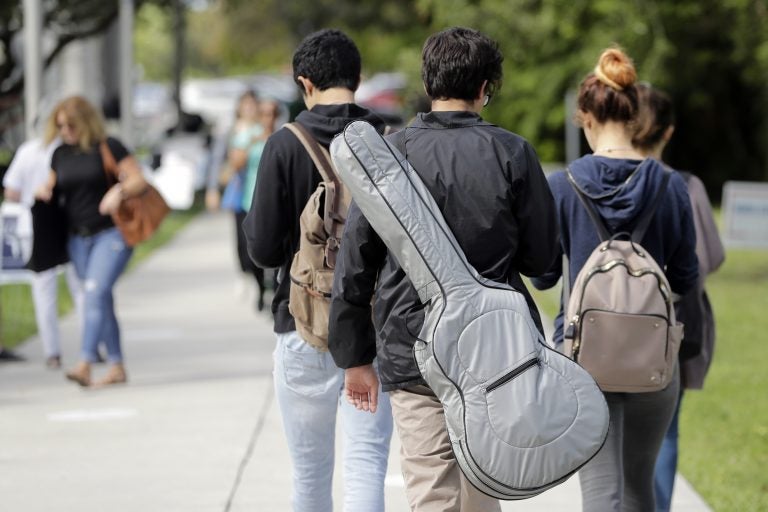N.J. lawmakers continue to chip away at boulder-sized problem of student debt
Two bills slated to come before committee Thursday hope to ease financial burdens on college students and their families and help them rehabilitate loans that are in default.

Two bills slated to come before committee Thursday hope to ease financial burdens on college students and their families and help them rehabilitate loans that are in default. (Lynne Sladky/AP Photo)
This story originally appeared on NJ Spotlight.
—
Now 2 ½ years after New Jersey lawmakers heard what one senator called “horrible” stories about state-issued college loans, legislators are still grappling with ways to assist those having trouble repaying their student debt.
The New Jersey Senate is scheduled today to consider two more bills meant to make it easier for those facing financial difficulty or judged in default to pay off NJCLASS loans. Lawmakers have already moved other measures, and the New Jersey Higher Education Student Assistance Authority has made several reforms to its largest borrowing program for college students. Close to 11,000 students took out more than $207 million in NJCLASS loans in the 2017-2018 school year.
Sen. Sandra Cunningham (D-Hudson), chair of the Senate Higher Education Committee and sponsor of the bills up for passage by the full house, said the measures resulted from a joint hearing by Senate and Assembly committees. Its intent was to look into “the atrocities some students were facing by receiving the NJCLASS loans” that had been detailed in a news report.
Is there life after NJCLASS?
“Some of the things we found out about were horrible,” Cunningham told the Senate Budget and Appropriations Committee on Monday during a hearing at which it unanimously approved S-3125 and S-3149. “We found many young people who felt that their lives were over at age 24 because once they received this NJCLASS loan, the payback and the way that everything was awarded was a horrific experience.”
She and other lawmakers sponsored a package of bills to reform HESAA, some of which already have been signed. The legislation that had the easiest time were ones requiring the authority to forgive the debt of someone who has died and another one capping the total amount a student can borrow at $150,000.
“Over the last two years we have been working very hard on trying to find a way to make sure that our young people can get the New Jersey CLASS loans, be treated with respect and dignity, and have a way of repayment that does not kill them, basically,” Cunningham said.
The bills slated for Senate approval today take steps in that direction, essentially codifying efforts that HESAA has taken since the legislative hearing in August 2016.
A way out of debt
S-3125 would establish two income-based repayment options for NJCLASS borrowers facing economic hardships that the authority has put in place. The repayment assistance program (RAP) allows eligible borrowers to reduce their payments to 10 percent of the household income of all parties on the loan for up to two years. During that time HESAA would pay the interest; the payments made by the borrower would be applied to the principal. The household income affordable-repayment plan would be available to borrowers who still can’t repay their loans after two years. It would allow them to pay 15 percent of total household income, with any remaining loan balance at the end of 25 years forgiven.
The fiscal note for the bill indicates that eight borrowers are currently being helped through RAP, with HESAA so far paying $10,275 in interest. The authority estimates it will wind up paying about $3,241 per month in RAP interest.
S-3149 would spell out the process that HESAA would use to declare a loan to be in default. Essentially, it uses the same rules that the authority currently uses. The big difference, however, is that the bill would give borrowers who are in default the opportunity to rehabilitate a loan if they make nine on-time monthly payments over the course of 10 months to HESAA. At that point, the default judgment would be removed from a borrower’s credit report.
Providing a way out of default for former students and their families unable to make high monthly loan payments, particularly during the recent recession and long recovery, has been a priority for many of those who came forward to talk about their problems with NJCLASS.
David Socolow, HESAA’s executive director, said it was important that the Legislature took steps to “shine a light on the need for reform.”
“I believe this package of two bills really codify the joint efforts that we have done … to preserve this program,” which Socolow said is important to help middle-class families pay for college.
WHYY is your source for fact-based, in-depth journalism and information. As a nonprofit organization, we rely on financial support from readers like you. Please give today.




